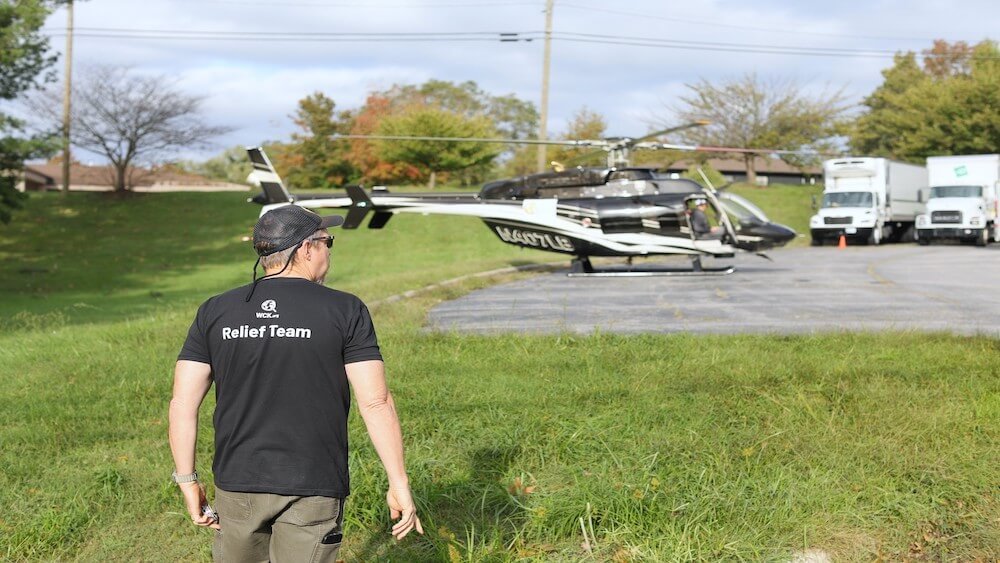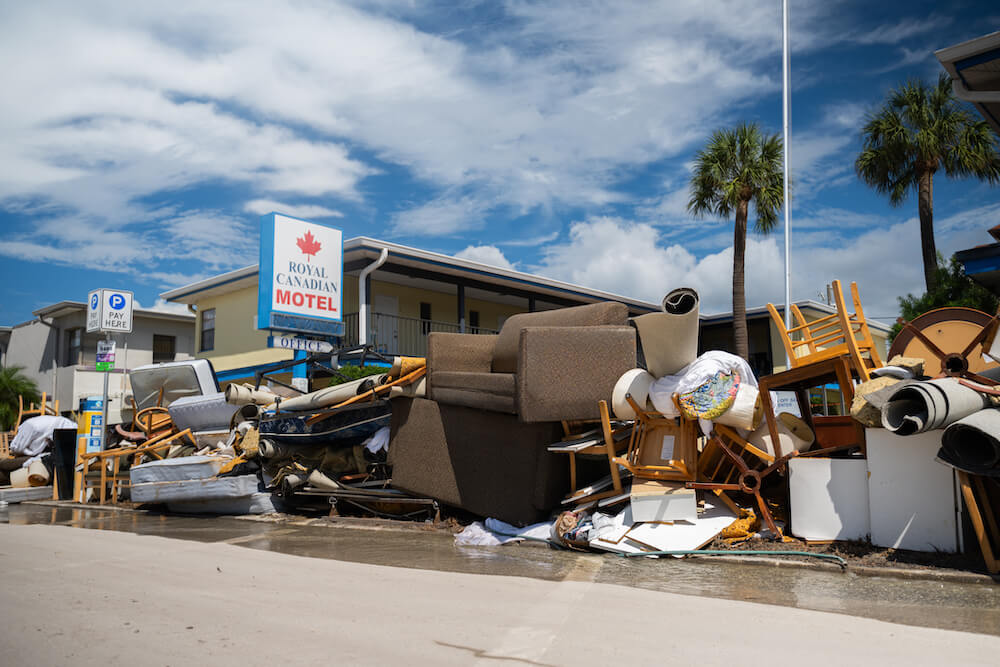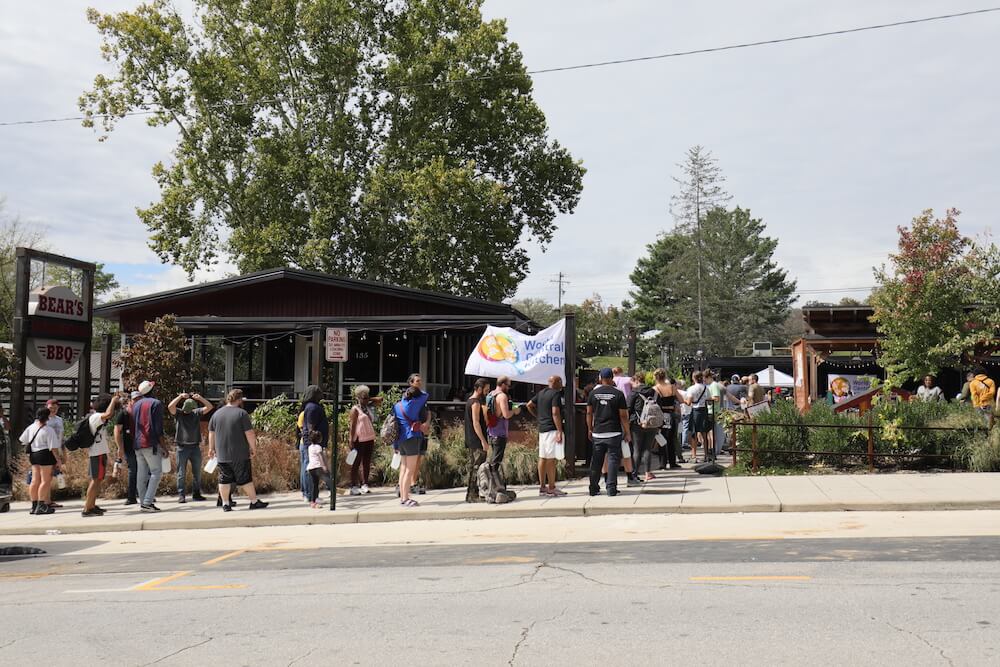
AccuWeather estimates that the total economic loss from Hurricane Helene could total up to $250 billion. So far, it is the deadliest storm to hit the mainland U.S. since Hurricane Katrina. (World Central Kitchen)
“Right now, we’re in triage mode,” said Melissa Murray, who spoke with Convene late on Oct. 4. after a long day of delivering emergency supplies to some of the hardest-hit areas in Western North Carolina. But there was a sliver of optimism in her voice: Murray, owner and CEO of Asheville, North Carolina–based event management company Mosaix Group, said that even though she is still without water, power had just been restored to her South Asheville home.
“I’m fortunate,” she said. “And you can see some really good progress taking place here.”
She is among a lucky minority in the region. After Category-4 Hurricane Helene cut a wide swath of devastation throughout the Southeastern U.S. on Sept. 26 and 27, thousands still remain without access to not only power and water, but food, shelter, or, in the most dire of cases, a way to evacuate or communicate with the outside world.
That is the situation for many areas in Western North Carolina, which saw rainfall totals top 20-30 inches. According to meteorologists, that downfall, coupled with rainfall from earlier in the week, overwhelmed the area’s rivers, streams, lakes, and reservoirs, resulting in catastrophic flash floods and landslides that swept through the mountainous region, taking roads, homes, businesses, and even entire towns with them.
As of publication, the storm’s confirmed death toll has climbed to 232 across six states, but reports from residents and emergency personnel on the ground in Western North Carolina indicate that the final number may be much higher, as many people are still reported missing and some areas remain inaccessible.

“Event planners have a dynamic skillset that allows them to be creative with solutions and challenging situations,” said Melissa Murray, owner and CEO, Mosaix Group. “So that is what we’re trying to do and what I’m trying to do on a much larger scale.”
In the past week and a half, Murray said she has been trying to “fill lots of gaps” in local recovery efforts — from sourcing portable toilets and tents for food banks to finding kitchens for Meals on Wheels. “I’ve been trying to take my skillset and contacts and be an effective solution for those who are looking for how to overcome a challenge or a problem in terms of resources,” she said. “Event planners have a dynamic skillset that allows them to be creative with solutions and challenging situations. So that is what we’re trying to do, and what I’m trying to do, on a much larger scale.”
Murray said she knows the road ahead will be challenging, not only with recovery but for the local hospitality industry at large. Tourism accounts for 15 percent of employment in the Asheville metro area, for example, and fall brings in close to a quarter of the state’s tourism visits.
“While our downtown, lodging, and much of our hospitality infrastructure fared well,” Explore Asheville shared in an update posted on LinkedIn on Oct. 2, “most areas are still without power and water service, and early stages of recovery are ongoing in parts of our beloved community.”
“As a company, we’re fortunate because we also operate in Charlotte, Greenville, and Raleigh,” Murray said. Mosaix is an accredited DMC and specializes in managing corporate events and meeting experiences for such clients as the Cancer Genomics Consortium, Mack Trucks, and the American Gas Association, among others. “We’re still operating in those markets, but this is definitely a blow to our high season [and] year-end revenue.”
However, she said she sees a flicker of light ahead. Already she has a corporate group interested in booking a meeting in Asheville in March 2025, in large part because they want to volunteer to help with recovery efforts.
“Asheville is heavily dependent on the hospitality and tourism industry,” Murray said. “So, there are going to be a lot of hospitality workers who will need support, and event professionals who will need support who won’t have venues to manage or tours to operate.”
As for now, she said, “my business is very important, but I have a really good team. My team can really run the business, I’m fortunate in that regard. My focus right now is my community.”
“I’m just hoping the attention stays on it … so that we can rebuild quicker and stronger,” she added. “And we will. We’re going to come out of this stronger in the end. I know we will.”

Debris is piled high outside of a motel in Clearwater Beach, Florida, where Hurricane Helene brought storm surges upwards of six feet to the area. (World Central Kitchen)
From Hosting to Helping
Throughout the Southeast, people from the travel, tourism, hospitality, events, F&B, and adjacent industries are mobilizing to provide aid. Chef José Andres’ World Central Kitchen is operating food and water aid stations in Asheville as well as other locations throughout North Carolina, Florida, Georgia, and Tennessee.
Many event venues and hotels are operating as shelters or as housing for aid workers. In Asheville, the Harrah’s Cherokee Center – Asheville — a popular event venue in downtown — has been operating an emergency shelter. According to local newspaper The Citizen-Times, many area hotels in Asheville are also offering space to displaced locals. Harrah’s Cherokee Casino Resort in nearby Cherokee has partnered with World Central Kitchen to deliver water and meals to those in need.
In Spartanburg, South Carolina, which President Biden visited on Oct. 2, the Spartanburg Memorial Auditorium opened as a shelter. In Greenville, South Carolina, the hospitality industry also stepped up to provide support.
“Our hotels have been housing Duke Energy and SCDOT crews, Red Cross volunteers, National Guardsmen, and displaced local residents,” said Heath Dillard, president of VisitGreenvilleSC, in an e-mail on Oct. 3. “Our restaurants and event venues are feeding thousands of volunteers and the community every day while our local airport is serving as a logistics hub to send supplies into harder-hit Western North Carolina. The Bon Secours Wellness Arena and Greenville Country Club are serving as medical emergency facilities to help those who need it.”
Nearby destinations are lending their support, too. Explore Charleston partnered with the city’s airport and Breeze Airways to deliver supplies to the Asheville region, including hard-to-find items like generators, propane, and chainsaws.
In Florida, Rosen Hotels & Resorts is offering reduced rates at seven of its Orlando properties to displaced residents living in those counties in which the Florida governor declared a state of emergency — as of Oct. 7, six out of seven properties are fully booked due to Hurricane Milton’s impending arrival this week, a representative confirmed.
Florida’s Gulf Coast experienced some of the most damaging storm surges in its history during Helene, including Tampa Bay and Clearwater/St. Pete. Clean-up efforts are still underway at many beaches — including Fort De Soto Park, Sand Key Park, Honeymoon Island State Park, and Caladesi Island State Park.
With Category-5 Milton stirring in the Gulf Coast, Florida is bracing for another historical storm while still reeling from Helene’s devastating effects.

People line up for food cooked at Bear’s Smokehouse BBQ in Asheville, North Carolina. The restaurant is one of more than a dozen across the Southeast that has partnered with the World Central Kitchen to feed residents in Helene-affected areas. (World Central Kitchen)
How to Help WNC
Want to support recovery efforts in Western North Carolina? Murray recommended the following local organizations:
MANNA FoodBank — This Asheville, North Carolina–based not-for-profit is a “huge part of the post-recovery food insecurity support and is a major distribution point,” Murray said.
Brother Wolf Animal Shelter — Also in Asheville, this animal shelter urgently needs donations to rebuild its adoption facility destroyed by flooding.
World Central Kitchen — “They are boots on the ground making things happen here both in the city and airlifting into the mountainous areas,” Murray said.
Shelter Dog Transport Alliance — This grassroots organization, a partnership of more than a dozen county animal shelters and rescues throughout the South, is transporting shelter animals from Western North Carolina and surrounding areas to adoption centers in New York, Ohio, and Canada.
In addition, Explore Asheville has set up the Always Asheville Fund to provide emergency grants to small, independent travel and hospitality businesses in Asheville and across Buncombe County. The DMO has already committed $300,000 from its own earned revenue to the fund. “According to the Federal Emergency Management Agency (FEMA), 40 percent of small businesses do not reopen after a disaster,” the DMO shared in a press release. “The organization aims to change that statistic for the region’s local entrepreneurs, ensuring their stories continue to shape its community’s future.”
If You Need Help
The Search Foundation, which provides financial aid to meeting and event industry professionals in crisis, is currently accepting applications for grants from those who experienced losses caused by Hurricane Helene. For those interested in making donations to the fund, Kate Patay, vice president of engagement at Terramar, A DMC Network Company, will be on site at IMEX America representing the Search Foundation (Booth E1901) and will speak on the foundation’s efforts during a presentation at the Inspiration Hub on Oct. 8 at 11 a.m. For more information, visit searchfoundation.org/get-help/.
Another resource for affected event professionals is the Meetings Industry Fund, which provides financial assistance to industry workers enduring financial distress, including help with medical bills, mortgage payments, food, clothing, and transportation. The application process remains completely anonymous.
“We’re an organization that touches people who, absolutely in their worst time, need help,” said Liz Dane, regional director, Mid Atlantic, Visit St. Pete-Clearwater, who serves on the board of the Meetings Industry Fund. For more information visit themeetingsindustryfund.org.
Jennifer N. Dienst is senior editor at Convene.
